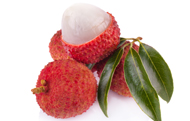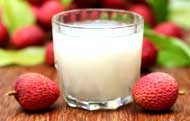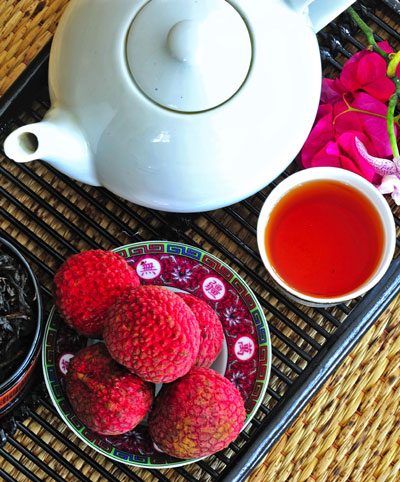





1. Lychee Facts
2. Types of Lychees
3. Nutritional Value of Lychees
4. Health Benefits of Lychees
Lychee (Litchi chinensis) is a monotypic taxon and the sole member in the genus Litchi in the soapberry family, Sapindaceae. The fruit is edible and has a sweet, mildly tart flavour and a distinctive floral aroma often described as rose-like.
There are three distinct subspecies of lychee. The most common is the Indochinese lychee found in South China, Malaysia, and northern Vietnam. The other two are the Philippine lychee (locally called alupag or matamata) found only in the Philippines and the Javanese lychee cultivated in Indonesia and Malaysia. A tall evergreen tree, it bears small fleshy sweet fruits. The outside of the fruit is a pink-red, rough-textured soft shell.
History and Origin
Lychees originated in southern China and possibly northern Vietnam around 1059 AD, with unofficial records going back to 2000 BC. They were historically a delicacy for the Chinese imperial court and spread to other parts of the world, including Australia in the 1870s via Chinese gold seekers. Today, they are a commercially important fruit cultivated in many countries.
- • Kwai Mai Pink
- • Salathiel
- • Erdon Lee
- • Bengal
- • Fay Zee Siu
- • Tai So
- • Suey Tung
- • Chom Pogo
- • Baitaying
- • No Mai Tsz
Common lychee types grown and sold in Australia include the widely cultivated Kwai Mai Pink, and Australian-developed varieties like Salathiel and Erdon Lee.
Other popular options include Bengal, Fay Zee Siu, Tai So, and Suey Tung.
Popular varieties
Kwai Mai Pink: The most widely grown variety in Australia, popular for its flavour, shelf life, and appearance.
Salathiel: Developed in Australia, it is known for its smooth skin and very small seed.
Erdon Lee: Also called "Dragon Egg" or "Giant Fruit Lychee," this variety produces extra-large fruit.
Bengal: Produces large, red, sweet, and aromatic fruit with a smooth, easy-to-peel skin.
Fay Zee Siu: A tropical variety grown in northern Queensland.
Tai So: A compact tree that produces sweet fruit with pinky-red skin.
Suey Tung: The first variety cultivated in Australia.
Chom Pogo: Another tropical variety from northern Queensland.
Baitaying: Grown in northern Queensland, extending the season.
No Mai Tsz: A sought-after variety that can have a single, shrivelled seed.
Fruit ” Lychee ” ( Nutritional value )
Nutritional value per 100 g
Litchis, raw
|
Nutrient ( Proximate’s )
|
Unit
|
Value
|
Daily Value %
|
|
Energy
|
kcal
|
66
|
3.3%
|
|
Protein
|
g
|
0.83
|
1.6%
|
|
Total lipid (fat)
|
g
|
0.44
|
0.5%
|
|
Carbohydrate, by difference
|
g
|
16.53
|
6.0%
|
|
Fiber, total dietary
|
g
|
1.3
|
4.6%
|
|
Sugars, total
|
g
|
15.23
|
|
|
Minerals
|
|||
|
Calcium, Ca
|
mg
|
5
|
0.3%
|
|
Iron, Fe
|
mg
|
0.31
|
1.7%
|
|
Magnesium, Mg
|
mg
|
10
|
2.3%
|
|
Phosphorus, P
|
mg
|
31
|
2.4%
|
|
Potassium, K
|
mg
|
171
|
3.6%
|
|
Sodium, Na
|
mg
|
1
|
0.04%
|
|
Zinc, Zn
|
mg
|
0.07
|
0.6%
|
|
Copper, Cu
|
mg
|
0.148
|
16.4%
|
|
Manganese, Mn
|
mg
|
0.055
|
2.3%
|
|
Selenium, Se
|
mcg
|
0.6
|
1.0%
|
|
Vitamins
|
|||
|
Vitamin C, total ascorbic acid
|
mg
|
71.5
|
79.4%
|
|
Thiamin (B-1)
|
mg
|
0.011
|
0.9%
|
|
Riboflavin (B-2)
|
mg
|
0.065
|
5%
|
|
Niacin (B-3)
|
mg
|
0.603
|
3.7%
|
|
Vitamin B-6
|
mg
|
0.100
|
5.8%
|
|
Vitamin B-12
|
mg
|
0.00
|
0.00
|
|
Folate DFE (dietary folate) (B-9)
|
mcg
|
14
|
3.5%
|
|
Vitamin A, RAE (retinol)
|
mcg
|
0
|
0
|
|
Vitamin E (alpha-tocopherol)
|
mg
|
0.07
|
0.4%
|
|
Vitamin D (D2 + D3)
|
mcg
|
0
|
0
|
|
Vitamin K (phylloquinone)
|
mcg
|
0.4
|
0.3%
|
|
Lipids
|
|||
|
Saturated Fatty Acids
|
g
|
0.099
|
0.4%
|
|
Monounsaturated Fatty Acids
|
g
|
0.120
|
|
|
Polyunsaturated Fatty Acids
|
g
|
0.132
|
|
|
Trans Fatty Acids
|
g
|
0.000
|
|
|
Carotenoids
|
|||
|
Beta-Carotene
|
mcg
|
0
|
|
|
Lutein + zeaxanthin
|
mcg
|
0
|
|

|
Reference Values are based on a 2,000 Calorie Intake, for Adults and Children 4 or More Years of Age. Your daily values may be higher or lower depending on your calorie needs.
|
|
Percentages are roughly approximated using (RDA) Recommended Dietary Allowances for adults. Source: Nutrient Database – USDA (United States Department of Agriculture)
|
|
Reference Values for Nutrition – FDA U.S. Food and Drug Administration
|
Lychee Nutritional Value
Lychees provide numerous health benefits, including being a great source of vitamin C, which boosts the immune system and protects against infections. They also contain beneficial antioxidants like oligonol that can help with blood flow, skin health, and weight management. Additionally, lychees are rich in minerals like potassium and copper, which support heart and bone health.
- EXCELLENT SOURCE OF VITAMIN C
Lychees are an excellent source of vitamin C, with 100 grams providing over 100% of the daily recommended value. This high vitamin C content supports immune function, helps produce collagen for healthy skin and joints, and acts as an antioxidant to protect cells from damage. - HEART HEALTH
Lychee supports heart health by providing nutrients like vitamin C, potassium, and fiber, which help regulate blood pressure and cholesterol levels. It is also rich in antioxidants that can protect against oxidative damage and may have cardioprotective effects, though more human research is needed for definitive conclusions. - IMPROVED BLOOD CIRCULATION
Lychee improves blood circulation due to compounds like copper, which is essential for red blood cell formation, and a polyphenol called Oligonol, which improves blood flow and oxygenation to organs. Additionally, lychee's high potassium content helps regulate blood pressure, and its vitamin C content helps scavenge harmful free radicals that can impede circulation. - ANTI-CANCER EFFECTS
Lychee consumption has been associated with a wide range of beneficial effects, including reduced oxidative stress, modulation of Nrf2 and NF-κB, improved amyloid and Tau pathology, protection of dopaminergic neurons, as well as anti-cancer effects such as cell-cycle arrest, mitochondrial apoptosis, and anti-angiogenesis - SKIN HEALTH
Lychees benefit skin health due to their high content of vitamin C and antioxidants, which promote collagen production, fight oxidative stress, and protect against sun damage. These properties can help reduce the appearance of fine lines and wrinkles, even out skin tone, and hydrate the skin, leading to a more youthful and glowing complexion. Lychee also has antimicrobial and anti-inflammatory properties that can help soothe irritated skin.

- BONE STRENGTH
Lychee provide essential minerals like magnesium, phosphorus, iron, and manganese, which are vital for bone density. Additionally, lychee contains copper, which helps build bones and skin, and vitamin C, which is crucial for forming collagen, a key component of healthy bones. - RICH IN B-COMPLEX VITAMINS
Lychees are rich in B-complex vitamins like niacin, thiamine, riboflavin, and folate, which are essential for metabolizing carbohydrates, proteins, and fats. These B vitamins help support metabolism, nerve function, and the production of red blood cells, making lychees a nutritious fruit when eaten in moderation. - GOOD SOURCE OF MINERALS
Lychees are a good source of minerals like potassium and copper, with smaller amounts of magnesium, phosphorus, and zinc. Potassium is important for heart health and blood pressure, while copper is essential for red blood cell production. - DIGESTIVE HEALTH
Lychees support digestive health primarily through their high fiber content, which aids in preventing constipation by adding bulk to stools and promoting regular bowel movements. The fruit also contains prebiotics that help nourish healthy gut bacteria, which is crucial for proper digestion and can help prevent issues like bloating and indigestion. - ANTIOXIDANT AND ANTI-INFLAMMATORY EFFECTS
Lychee possesses significant antioxidant and anti-inflammatory effects due to its high content of bioactive compounds like polyphenols and vitamin C. These compounds protect cells from damage caused by oxidative stress, inflammation, aging, and pollution, potentially lowering the risk of various chronic diseases. The anti-inflammatory action of lychee is linked to its ability to suppress inflammatory markers, while its antioxidant properties come from its ability to scavenge free radicals and provide electrons to stabilize them.
References
Nutrient Database – USDA (United States Department of Agriculture)
Reference Values for Nutrition – FDA U.S. Food and Drug Administration
Excellent source of Vitamin C - lychees are an excellent source of vitamin C, with 100 grams providing over 100% of the daily recommended value. This high vitamin C content supports immune function, helps produce collagen for healthy skin and joints, and acts as an antioxidant to protect cells from damage.
Rich in B-complex vitamins - Lychees are rich in B-complex vitamins like niacin, thiamine, riboflavin, and folate, which are essential for metabolizing carbohydrates, proteins, and fats. These B vitamins help support metabolism, nerve function, and the production of red blood cells, making lychees a nutritious fruit when eaten in moderation.
Good source of minerals - Lychees are a good source of minerals like potassium and copper, with smaller amounts of magnesium, phosphorus, and zinc. Potassium is important for heart health and blood pressure, while copper is essential for red blood cell production.
Antioxidant and anti-inflammatory effects - Lychee possesses significant antioxidant and anti-inflammatory effects due to its high content of bioactive compounds like polyphenols and vitamin C. These compounds protect cells from damage caused by oxidative stress, inflammation, aging, and pollution, potentially lowering the risk of various chronic diseases. The anti-inflammatory action of lychee is linked to its ability to suppress inflammatory markers, while its antioxidant properties come from its ability to scavenge free radicals and provide electrons to stabilize them.
Improved blood circulation - Lychee improves blood circulation due to compounds like copper, which is essential for red blood cell formation, and a polyphenol called Oligonol, which improves blood flow and oxygenation to organs. Additionally, lychee's high potassium content helps regulate blood pressure, and its vitamin C content helps scavenge harmful free radicals that can impede circulation.
Skin health - Lychees benefit skin health due to their high content of vitamin C and antioxidants, which promote collagen production, fight oxidative stress, and protect against sun damage. These properties can help reduce the appearance of fine lines and wrinkles, even out skin tone, and hydrate the skin, leading to a more youthful and glowing complexion. Lychee also has antimicrobial and anti-inflammatory properties that can help soothe irritated skin.
Heart health - Lychee supports heart health by providing nutrients like vitamin C, potassium, and fiber, which help regulate blood pressure and cholesterol levels. It is also rich in antioxidants that can protect against oxidative damage and may have cardioprotective effects, though more human research is needed for definitive conclusions.
Anti-cancer effects - Lychee consumption has been associated with a wide range of beneficial effects, including reduced oxidative stress, modulation of Nrf2 and NF-κB, improved amyloid and Tau pathology, protection of dopaminergic neurons, as well as anti-cancer effects such as cell-cycle arrest, mitochondrial apoptosis, and anti-angiogenesis
Bone strength - Lychee supports bone strength by providing essential minerals like magnesium, phosphorus, iron, and manganese, which are vital for bone density. Additionally, lychee contains copper, which helps build bones and skin, and vitamin C, which is crucial for forming collagen, a key component of healthy bones.
Digestive health - Lychees support digestive health primarily through their high fiber content, which aids in preventing constipation by adding bulk to stools and promoting regular bowel movements. The fruit also contains prebiotics that help nourish healthy gut bacteria, which is crucial for proper digestion and can help prevent issues like bloating and indigestion.
